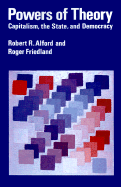Book contents
- Frontmatter
- Contents
- Preface
- Acknowledgments
- Introduction: State and society in theoretical perspective
- 1 Theoretical perspectives as modes of inquiry
- PART I THE PLURALIST PERSPECTIVE
- PART II THE MANAGERIAL PERSPECTIVE
- PART III THE CLASS PERSPECTIVE
- 12 State and society in class perspective
- 13 The capitalist state and accumulation
- 14 The capitalist state and class struggle
- 15 The class perspective on the democratic state
- 16 The class perspective on the bureaucratic state
- PART IV THEORY, POLITICS, AND CONTRADICTIONS IN THE STATE
- Glossary
- Bibliography
- Name index
- Subject index
15 - The class perspective on the democratic state
Published online by Cambridge University Press: 01 June 2011
- Frontmatter
- Contents
- Preface
- Acknowledgments
- Introduction: State and society in theoretical perspective
- 1 Theoretical perspectives as modes of inquiry
- PART I THE PLURALIST PERSPECTIVE
- PART II THE MANAGERIAL PERSPECTIVE
- PART III THE CLASS PERSPECTIVE
- 12 State and society in class perspective
- 13 The capitalist state and accumulation
- 14 The capitalist state and class struggle
- 15 The class perspective on the democratic state
- 16 The class perspective on the bureaucratic state
- PART IV THEORY, POLITICS, AND CONTRADICTIONS IN THE STATE
- Glossary
- Bibliography
- Name index
- Subject index
Summary
Democracy is a secondary aspect of the state within the class perspective; thus there are relatively few studies that single it out for explanation. Democracy is seen either as a direct consequence of class struggle, as a fictitious symbol mystifying the working class, as representing conflicts only among capitalist interests, or as a vision of the future, unrealizable under conditions of capitalism.
Democracy and capitalism
Class theorists admit that there is almost no serious class theory of the democratic aspect of the state. Swedish sociologist Goran Therborn said that “the entire Marxist tradition has had enormous difficulty in coming to grips with the paradoxical phenomenon of bourgeois democracy – a regime in which the exploiting minority rules by means of a system of legally free popular elections” (1978, p. 248). British sociologist Colin Crouch adds that “most Marxist theory [is reluctant] to admit any element of genuine pluralism within the polities of the liberal democracies” (1979, p. 13). One reason is a fear that the theorists will lose the distinctive political and theoretical commitments to socialism, the working class, and revolution and become mere reformists by using the tools of bourgeois democratic institutions. Political philosopher C. B. MacPherson agrees with this possibility. “Pluralism had (and has) socialist advocates but its influence has not been confined to socialist ranks, and its effect has been to turn social thought away from class by emphasizing the multiplicity and moral value of group life.”
- Type
- Chapter
- Information
- Powers of TheoryCapitalism, the State, and Democracy, pp. 333 - 360Publisher: Cambridge University PressPrint publication year: 1985

